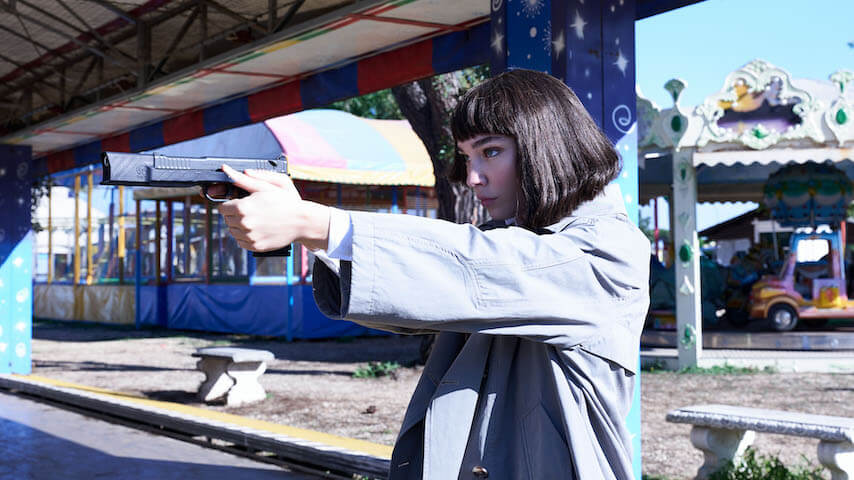Amazon is betting big on more Citadel, but will it pay off?
While not drawing a ton of hype, Prime Video's pricey franchise shows no signs of slowing down.
Citadel: Diana (Photo: Marco Ghidelli/Prime Video)
The battle for TV supremacy has grown more crowded than ever. With literally dozens of new shows released across dozens of platforms each month, networks and studios are fighting for an ever-shrinking share of attention from audiences who are drowning in choice. In the post-Game Of Thrones landscape, it seems increasingly unlikely that we’ll ever again have that watercooler show that becomes both a commercial smash and cultural touchstone. But that hasn’t stopped everyone from trying to capture the zeitgeist.
Amazon, while an indomitable corporate force in every other area of our lives, has struggled to get viewers to latch onto its lavish, often wildly expensive original programming. Fallout and The Boys may have broken the curse but then there are series like The Lord Of The Rings: The Rings Of Power, the single most expensive TV series ever created that has yet to feel like an essential show, or The Wheel Of Time, a creaky fantasy drama that looks and feels years out of date. Jeff Bezos’ Hollywood wing has the luxury of that pre-established financial security net, meaning Prime Video is often more willing to fling money at a show to keep it around and see if it will eventually work. That’s certainly admirable compared to the cancellation-heavy frenzies of Netflix, but then you’re left wondering where all of that cash went and why. Case in point: a big money pit and Prime’s most glaring example of trying to birth a mega-hit IP, the Citadel franchise.
The brainchild of Amazon Studios chief Jennifer Salke, Citadel was imagined as the world’s first global TV series, a multi-pronged expanded universe of interconnecting narratives and characters spanning decades and continents. She enlisted the Russo brothers, who certainly know their way around a major franchise, to bring the concept to life. Citadel would have its main title series to act as the anchor of the saga, then many international versions that would utilize local talent and appeal to different worldwide demographics. There would be spin-off shows set in Africa, Europe, and Asia. The first one, Citadel: Diana, which premiered October 10, is an Italian production, while Citadel: Honey Bunny, which kicked off November 7, is an Indian one. It made sense for Amazon, ever the purveyors of algorithmic control and appealing to literally everyone. And it was a concept they so thoroughly believed in that it put down $300 million for the six-episode first season.
Citadel, the franchise mothership, starred Priyanka Chopra and Richard Madden as agents Nadia and Mason, Citadel agents whose memories are wiped after the discovery of a rival agency, Manticore. Eight years after that, both are living quiet lives as seemingly normal people until they are dragged back into their old occupations as Manticore extends its reach into the world of espionage and treachery. It’s a familiar concept for the spy genre, a little bit of Craig-era Bond with a dash of The Long Kiss Goodnight and True Lies, plus the kinetic pacing of Mission: Impossible. In execution, however, it was sorely lacking.
Madden and Chopra, two talented and gorgeous actors, have no chemistry, and their “we have Bond at home”-style attempt at sexy banter is no substitute. They’re playing this tired concept entirely seriously, while stalwart character actors Lesley Manville and Stanley Tucci at least seem aware that there’s some silliness to be mined from such self-important fodder. It’s a show that takes itself extremely seriously but not in a way that could help to elevate such material. The plot is on rails, unfolding in all the expected ways but still feeling curiously half-baked. The first season underwent massive amounts of reshoots, and it’s evident in the final product.
All that and it doesn’t even look expensive. This is a major problem with modern blockbusters, films with $200-million-plus budgets that look as gray and inert as films a tenth their cost. There’s an overt slickness to Citadel’s action scenes that robs it of its impact, rendering high-stakes set-pieces flat and safe, a matter not at all helped by chintzy CGI that exacerbates the artifice of it all.
Citadel premiered in May 2023 and was met with a worldwide shrug. Reviews were middling, and audiences didn’t seem to care. It’s left behind a shockingly small footprint, even at a time when niche shows can thrive if they find their viewers. Nielsen’s weekly streaming rankings for its second full week of availability (via Variety) noted that it just missed the streaming originals top-ten chart, putting it behind John Mulaney’s latest standup special, Baby J. But they’d invested so much into the concept already that of course a second season was greenlit, with Joe Russo set to direct every episode. And the spin-offs were in the pipeline, waiting for their chance. Citadel: Diana was released to little fanfare and very few mainstream reviews in America (although it did well in Italy), while Citadel: Honey Bunny has received similarly muted hype.






![Rob Reiner's son booked for murder amid homicide investigation [Updated]](https://img.pastemagazine.com/wp-content/avuploads/2025/12/15131025/MixCollage-15-Dec-2025-01-10-PM-9121.jpg)

























![HBO teases new Euphoria, Larry David, and much more in 2026 sizzle reel [Updated]](https://img.pastemagazine.com/wp-content/avuploads/2025/12/12100344/MixCollage-12-Dec-2025-09-56-AM-9137.jpg)







